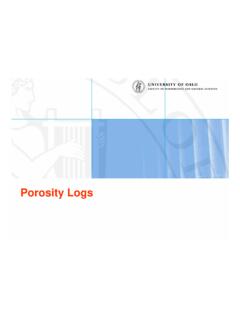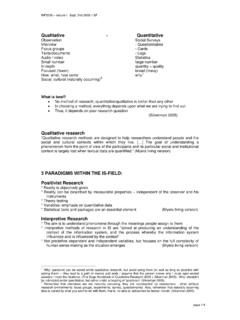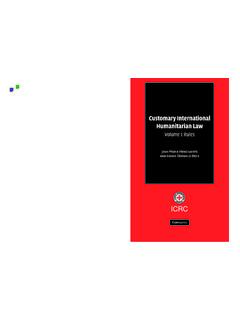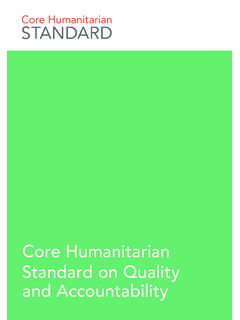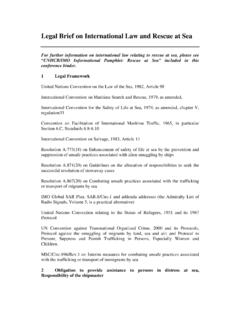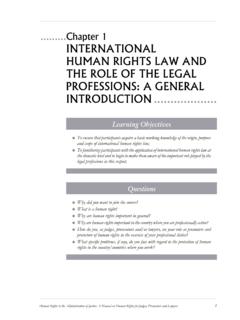Transcription of Relationship between national and international law
1 Relationship between national and international law Amrei M ller Public international Law, University of Oslo 14 October 2013. Structure 1. (Traditional) theories 2. international law's perspective on national law 3. national law's perspective on international law 4. Beyond the divide of national and international law: some more recent developments Theories Dualism and monism Capture some, but not all of multifaceted Relationship between domestic and international law today Dualism (Triepel/Anzilotti). international and domestic legal order exist as two separated, distinct sets of legal orders Differences in: subjects, sources, content Requires transformation' of int. law into domestic law to make int. law binding on domestic authorities (incorporation). States decide on modes of incorporation (how).
2 national law has priority over int. law that has not been incorporated But: by doing so, a state may not violate its national laws, but it might incur international responsibility Theories Monism (Kelsen). Nat. law and int. law as one unitary, coherent system Int. law at top of pyramid, (in)validating acts of domestic legal systems In case of conflict, int. law prevails No need for transformation' of int. law into domestic law No strict distinction between subjects of nat. and int. law; role of individuals Theories Different visions of the international legal system Monism Dualism international law above domestic law, controlling domestic legal systems ultimately, national (state) interests can overrule international law open to the view that international values can override domestic values emphasises role of states as most more likely to see international law important subjects of international as legal system that ultimately aims law; international law protecting to protect interests of all individuals state's interests some distrust towards states international law first and foremost founded upon state consent Today: pluralism as the characteristic of the Relationship of nat.
3 And int. legal system? international law's perspective on national law national law in international treaties/custom VCLT. Nat. law cannot be invoked to justify non- compliance with int. law ( ). : 1. A State may not invoke the fact that its consent to be bound by a treaty has been expressed in violation of a provision of its internal law regarding competence to conclude treaties as invalidating its consent unless that violation was manifest and concerned a rule of its internal law of fundamental importance. 2. A violation is manifest if it would be objectively evident to any State conducting itself in the matter in accordance with normal practice and in good faith. international law's perspective on national law national law in international treaties/custom VCLT.
4 ICJ Cases: Case concerning the land and maritime boundary between Cameroon and Nigeria, 2002. LaGrand (Germany v US), 2001 and Avena and Other Mexican Nationals (Mexico v US), 2004: the rights granted under the Convention [on consular Relations] are treaty rights which the US has undertaken to comply with in relation to the individual concerned, irrespective of the due process rights under the US. constitutional law.' ( ). the remedy to make good these violations should consist in an obligation on the US to permit review and consideration of these (foreign) nationals'. cases by the US courts with a view to ascertaining whether in each case the violation of [of the Convention on Consular Relations]. committed by the competent authorities caused actual prejudice to the defendant in the process of the administration of criminal justice.
5 '. ( ). Sensible approach? Or need for more' implementation freedom/discretion? international law's perspective on national law national law in international treaties/custom General duty to bring national law in conformity with obligations under international law? PCIJ (1925), Exchange of Greek and Turkish Populations self-evident' principle in international law, according to which a state which has contracted valid international obligations is bound to make in its legislation such modifications as may be necessary to ensure the fulfilment of the obligations undertaken' ( ). But: a failure to bring about conformity will not in itself be a breach of int. law; breach usually only occurs when state fails to observe obligation on a specific occasion national law in international treaties/custom national law in international treaties/custom General duty to bring national law in conformity with obligations under international law?
6 Treaties posing duties on states to enact national legislation or take various other measures to implement an int. obligation Some examples: Human rights law: each State Party to the present Covenant undertakes to take the necessary steps, in accordance with its constitutional processes and with the provisions of the present Covenant, to adopt such laws or other measures as may be necessary to give effect to the rights recognized in the present Covenant.' ( (2) ICCPR). States undertake (a) To embody the principle of the equality of men and women in their national constitutions or other appropriate legislation if not yet incorporated therein and to ensure, through law and other appropriate means, the practical realisation of this principle.' ( (a) CEDAW). Effective domestic remedies/right to fair trial: requires establishment of a well- functioning court system Establishment of domestic bodies: obligation to establish national Preventive Mechanisms, which are independent national bodies for the prevention of torture and ill-treatment at the domestic level ( OP-CAT).
7 national law in international treaties/custom national law in international treaties/custom General duty to bring national law in conformity with obligations under international law? Treaties posing duties on states to enact national legislation or take various other measures to implement an int. obligation Some examples: international humanitarian law/arms control Convention on Cluster Munitions: (2): Each State Party undertakes to destroy or ensure the destruction of all cluster munitions as soon as possible but not later than eight years after the entry into force of this Convention for that State Party.'. : Each State Party shall take all appropriate legal, administrative and other measures to implement this Convention, including the imposition of penal sanctions to prevent and suppress any activity prohibited to a State Party under this Convention undertaken by persons or on territory under its jurisdiction or control.
8 '. Geneva Convention I-IV. The High Contracting Parties undertake to enact any legislation necessary to provide effective penal sanctions for persons committing, or ordering to be committed, any of the grave breaches of the present Convention '. national law in international treaties/custom national law in international treaties/custom General duty to bring national law in conformity with obligations under international law? Treaties posing duties on states to enact national legislation or take various other measures to implement an int. obligation Some examples: international criminal law ICC Statute: State parties shall ensure that there are procedures available under their national law for all the forms of cooperation which are specified under this part [Part 9 on international cooperation and judicial assistance]'.
9 ICTY, Prosecutor v Furundzija (Trial Camber, IT-95-17/1-T) case: Ius cogens character of rules prohibiting and criminalising torture requires states to enact domestic legislation prohibiting torture under domestic law international law's perspective on national law national law in treaties/custom Domestic law and international custom State practice and opinio iuris domestic legislation, administrative acts, decisions of domestic courts as evidence of state practice But: practice must be widespread and (relatively). uniform ICJ Arrest Warrant case (DRC v Belgium), 2002: The Court has carefully examined State practice, including national legislation and those few decisions of national higher courts, such as the House of Lords or the French Court of Cassation.
10 It has been unable to deduce from this practice that there exists under customary international law any form of exception to the rule according immunity from criminal jurisdiction and inviolability to incumbent Ministers for Foreign Affairs, where they are suspected of having committed war crimes or crimes against humanity.' ( ). international law's perspective on national law international courts' use of domestic law Different approaches of different int. courts Our focus: ICJ. (1)(d) ICJ Statute: The Court, whose function is to decide in accordance with international law such disputes as are submitted to it, shall apply: .. (d) , judicial decisions , as subsidiary means for the determination of rules of law.'. No direct sources of law, but subsidiary sources ICJ can rely on decisions of other international courts decisions national courts, when they deal with a question of international law international law's perspective on national law international courts' use of domestic law Domestic law/decisions of domestic courts as facts national law/domestic court decisions are among the facts' that can cause a dispute and/or breach of int.
